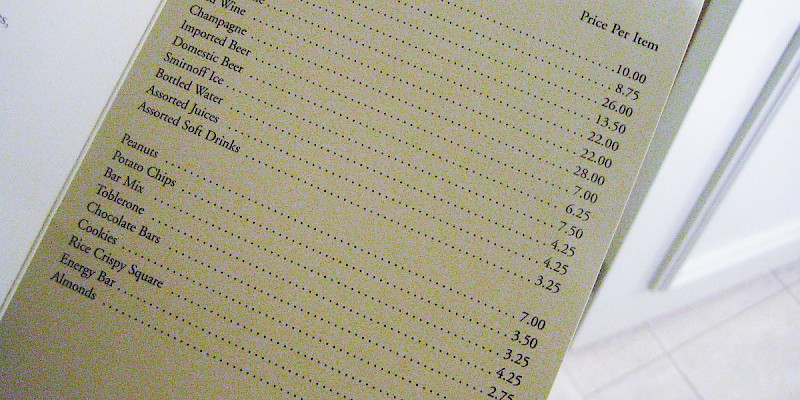Hotel minibars
Avoid the scandalously high prices of the hotel minbar
Seven bucks for a can of Coca-Cola? A fiver for a miniature can of Pringles? Yep, that about sums it up. The minibar: minting money for the hotel industry since the early 1980s (if you're looking for someone to blame, it was supposedly invented at the Westin in Ottawa, Canada).
Seriously folks, just say no.
Simply push aside the overpriced peanuts and $4 bottle of tap water so you can use the minibar as a minifridge for the couple of sodas or beers you grabbed at the local grocery store and to store your picnic purchases.
But, for heaven's sake, just leave the teensy bottles of liquor alone.
Beware the False Minibar Charge
You should always scrutinize your hotel bill and ask about any incremental charge you see on there that is anything other than the amount you agreed to pay multiplied by the number of nights stayed. Rather frequently, I'll find a phone or minibar charge on there that I never did anything to provoke.
Now, I try to trust in the goodness of my fellow human beings, so usually I chalk this up to a computer error or whatnot, but still, you must point it out and have it expunged. The most common of these false charges is for something from the minibar, and there's usually a good explanation (well, not good, but explicable): the maid.
No, she wasn't guzzling your mini bottles of vodka on the job. But many hotels use a shortcut to determine whether or not you've used the minibar—they have the maid jot down every empty bottle, can, or snack packaging she comes across in the room's trash can, and assume you got it from that tiny fridge under the TV and just "forgot" to tick it off on the honor sheet price list posted inside.
Why these hotels can't see the gaping flaw in this logic (that I might have bought that can of soda whilst out and about my day and just happened to finish it—and toss the empty—in my room) is beyond me, but there you go.
- Booking.com - We have done extensive testing, and Booking.com is hands-down the single best booking engine, with by far the largest number of hotels (and other lodging options) in all price ranges.Partner
- Agoda.com - This booking engine, once just an Asia specialist, has recently rocketed to second-best all around the world.Partner
- HotelsCombined.com - An aggregator looks at the results of all the booking engines and presents the prices it finds at each side-by-side. It's a great concept (and works well for airfares), however in our tests the actual booking engines themselves often offered better deals on more properties.Partner
- Hostelz.com - A booking engine that specailizes in hostels and cheap hotels.Partner
- Hotels.com - Since Hotels.com absorbed its Venere.com sibling, it has been performing much better in Europe than it once did.Partner
- Priceline.com - Priceline not only offers decent deals on standard hotel bookings, but also "Express Deals" in which you only get to know the hotel's star rating and neighborhood before you pay for it—but the savings can be substantial (usually 18%–20%, though occasionally much higher).Partner
- Hotwire.com - Like its competition Priceline, Hotwire offers both straightforward hotel bookings as well as "Hot Rate" deals that save you 25%–65% on hotels that you book blindly, knowing only the neighborhood and star rating before booking (and paying) for it.Partner
- Trivago.com - Depsite its aggressive advertising camapaigns, in our tests Trivago does not actually perform all that well as an aggregator (and it has gotten worse as time goes on). Still, it can be handy.Partner







